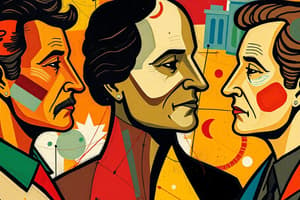Podcast
Questions and Answers
What is the definition of political science?
What is the definition of political science?
The study of politics, government systems, and political behavior.
List two branches of political science.
List two branches of political science.
Comparative Politics and International Relations.
Define legitimacy in the context of political science.
Define legitimacy in the context of political science.
Legitimacy is the acceptance of a governing regime’s right to rule.
What is a key characteristic of a democracy?
What is a key characteristic of a democracy?
What does the term 'sovereignty' refer to?
What does the term 'sovereignty' refer to?
Identify one political theory that focuses on socioeconomic factors.
Identify one political theory that focuses on socioeconomic factors.
What are international organizations and give an example?
What are international organizations and give an example?
What is the role of the judiciary in a political system?
What is the role of the judiciary in a political system?
Explain the term 'public opinion'.
Explain the term 'public opinion'.
What does 'political culture' refer to?
What does 'political culture' refer to?
Flashcards are hidden until you start studying
Study Notes
Overview of Political Science
- Definition: The study of politics, government systems, and political behavior.
- Branches:
- Comparative Politics
- International Relations
- Political Theory
- Public Administration
- Public Policy
Key Concepts
- Power: Ability to influence or control the behavior of people and institutions.
- Authority: Legitimate power recognized by society.
- Legitimacy: Acceptance of a governing regime’s right to rule.
- Sovereignty: Supreme power of a state to govern itself.
Political Theories
- Realism: Focuses on states as key actors and the role of power and national interests.
- Liberalism: Emphasizes democracy, human rights, and the importance of international institutions.
- Constructivism: Highlights the role of social constructs and identities in politics.
- Marxism: Analyzes class relations and societal conflict, focusing on socioeconomic factors.
Political Systems
- Democracy: Government by the people, typically through elected representatives.
- Authoritarianism: Centralized control with limited political freedoms.
- Totalitarianism: Extreme form of authoritarianism with total control over public and private life.
- Monarchy: Rule by a single person or family, either absolute or constitutional.
Key Institutions
- Executive: The branch of government responsible for enforcing laws (e.g., president, prime minister).
- Legislature: The law-making body (e.g., parliament, congress).
- Judiciary: The court system, which interprets laws and administers justice.
- Bureaucracy: Administrative system managing the day-to-day operations of government.
Political Behavior
- Political Culture: Shared beliefs, values, and norms about politics within a society.
- Public Opinion: The collective preferences and attitudes of the public towards political issues.
- Political Participation: Involvement in political processes, including voting, activism, and civic engagement.
International Relations
- Diplomacy: Art of negotiating and maintaining relationships between nations.
- Conflict and Cooperation: Dynamics of war, peace, and alliances among states.
- International Organizations: Entities like the UN and NATO that facilitate cooperation and address global issues.
Research Methods
- Qualitative Analysis: Focus on understanding the meaning and context of political phenomena.
- Quantitative Analysis: Use of statistical methods to analyze political data.
- Comparative Method: Comparing different political systems or institutions to draw conclusions.
Current Issues in Political Science
- Globalization: The impact of increasing interconnectedness on politics and governance.
- Populism: Political approach that seeks to represent the interests of ordinary people.
- Climate Change Policy: Government strategies to address environmental challenges.
- Human Rights: Examination of laws and practices to protect individual freedoms and dignity.
Overview of Political Science
- Political science is the study of government, power, and political behavior.
- There are many branches of political science, including comparative politics, international relations, political theory, public administration, and public policy.
Key Concepts
- Power is the ability to influence or control the behavior of people and institutions.
- Authority is legitimate power which is recognized by society.
- Legitimacy is the acceptance of a governing regime’s right to rule.
- Sovereignty is the supreme power of a state to govern itself.
Political Theories
- Realism emphasizes the role of power and national interests in international politics.
- Liberalism prioritizes democracy, human rights, and international cooperation.
- Constructivism focuses on social constructs and identities in shaping political realities.
- Marxism analyzes class relations and societal conflict, emphasizing socioeconomic factors.
Political Systems
- Democracy is a political system where power is held by the people, typically through elected representatives.
- Authoritarianism is a political system with centralized control and limited political freedoms.
- Totalitarianism is an extreme form of authoritarianism with total control over public and private life.
- Monarchy is a political system ruled by a single person or family, either absolutely or constitutionally.
Key Institutions
- Executive branch enforces laws, with positions like president or prime minister.
- Legislature is the law-making body, such as parliament or congress.
- Judiciary interprets laws and administers justice through courts.
- Bureaucracy is the administrative system that manages government's daily operations.
Political Behavior
- Political Culture refers to shared beliefs, values, and norms about politics within a society.
- Public Opinion is the collective preferences and attitudes of the public towards political issues.
- Political Participation is involvement in political processes, such as voting, activism, and civic engagement.
International Relations
- Diplomacy is the process of negotiating and maintaining relationships between nations.
- Conflict and Cooperation refer to dynamics of war, peace, and alliances among states.
- International Organizations such as the United Nations (UN) and North Atlantic Treaty Organization (NATO) facilitate cooperation and address global issues.
Research Methods
- Qualitative Analysis focuses on understanding the meaning and context of political phenomena.
- Quantitative Analysis uses statistical methods to analyze political data.
- Comparative Method compares different political systems or institutions to draw conclusions.
Current Issues in Political Science
- Globalization is the impact of increasing interconnectedness on politics and governance.
- Populism is a political approach that seeks to represent the interests of ordinary people.
- Climate Change Policy involves government strategies to address environmental challenges.
- Human Rights examines laws and practices to protect individual freedoms and dignity.
Studying That Suits You
Use AI to generate personalized quizzes and flashcards to suit your learning preferences.




